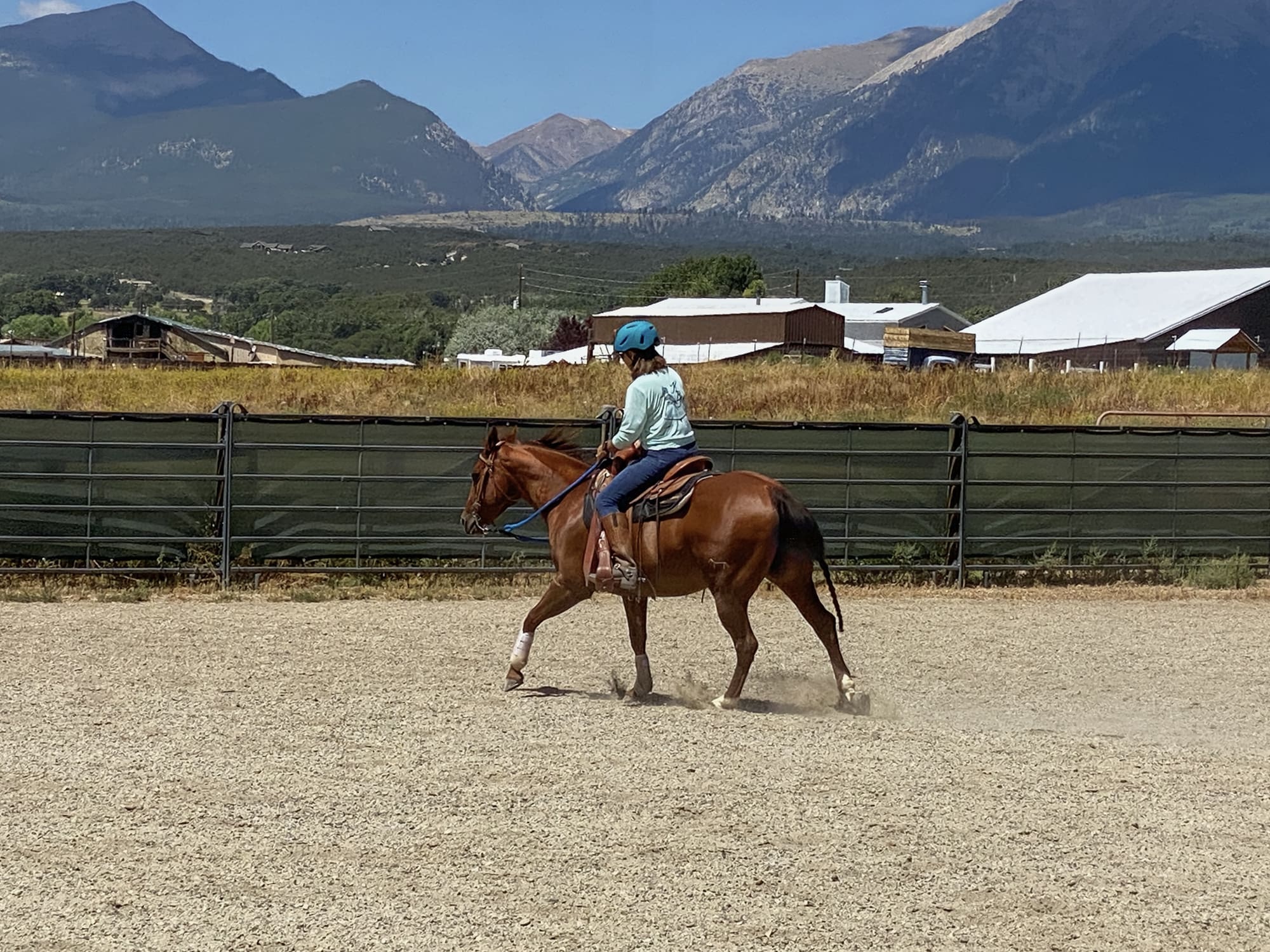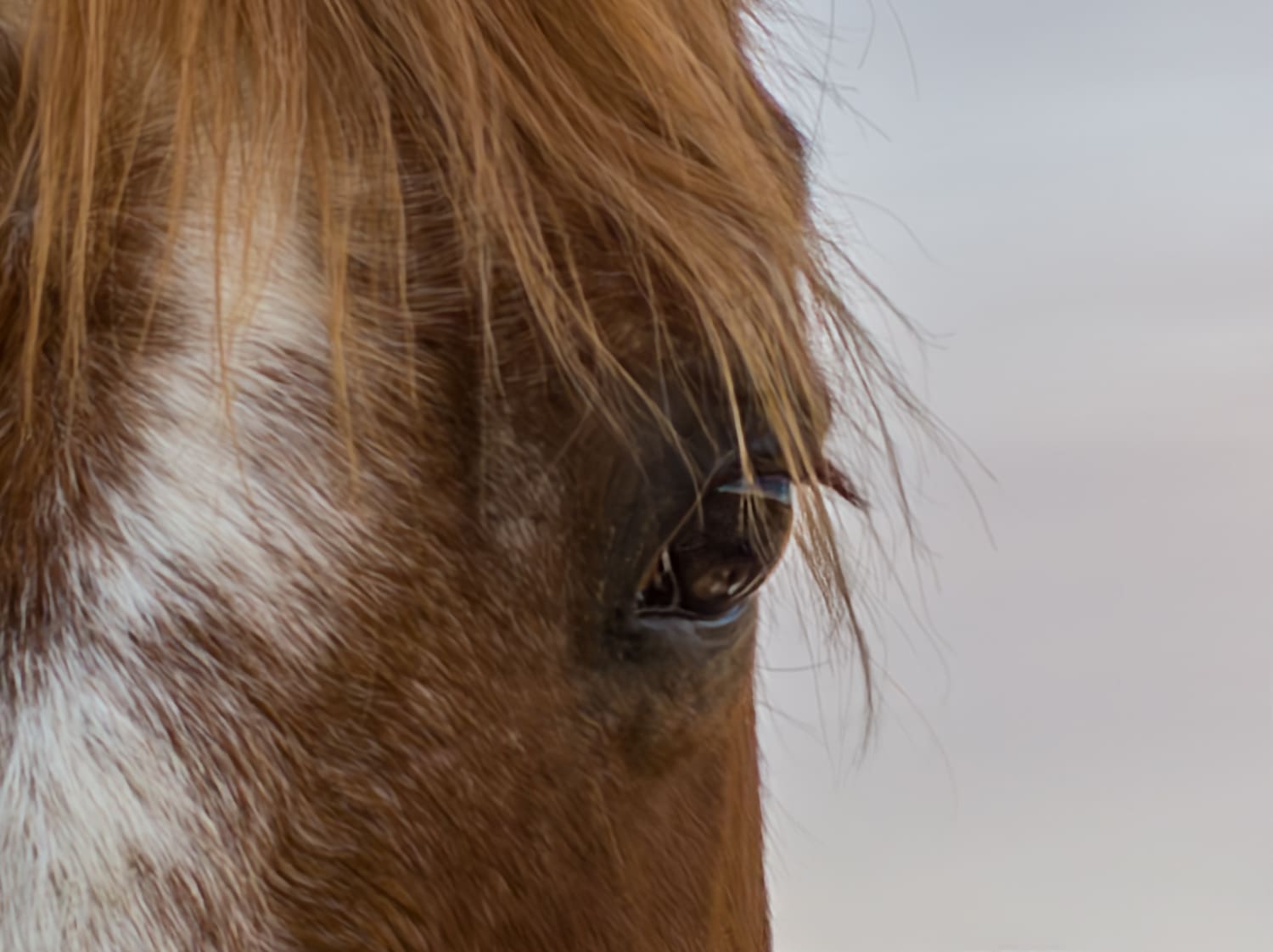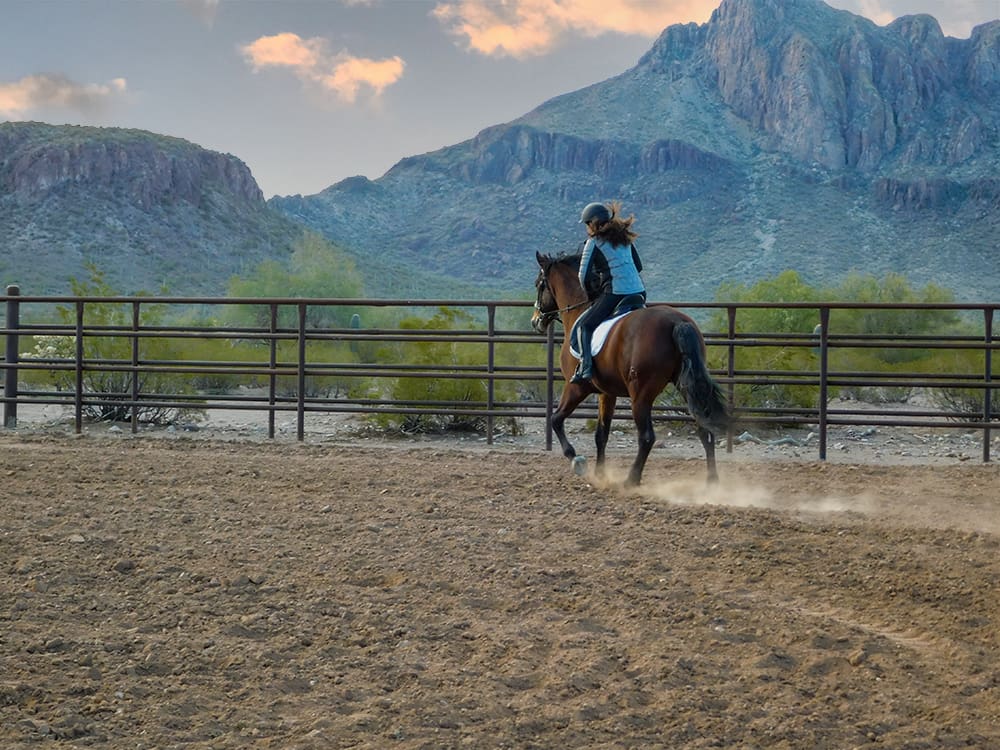
Should you let someone else ride your horse? There are two common points of view that I run into on this subject:
- “No! I do not want someone interfering with the connection/bond between my horse and me and everything my horse knows needs to come from me and only me.”
- “Yes! I want my horse to be well-rounded in his training and responsive, obedient to any rider, and safe for everyone.”
For me, the answer is unequivocally, “Yes!”
While there are pros and cons to each point of view, I learned decades ago the value of having different people ride a horse. I’m mostly referring to the benefits for the horse here, but riders also stand to gain invaluable knowledge and experience by riding a variety of horses. You truly will learn something different from each one.
On a daily basis, I see how horses benefit from opportunities to get used to different riders. It was also one of the most powerful lessons I learned early on in my horse training career.
Like most young trainers, when I first started my horse training business, I’d pretty much work with any horse someone was willing to pay me to ride. I was starting a lot of young horses and sorting out “problem” horses (which usually turned out to be problem people). There was never a shortage of horses that needed training—too many to remember all of them—but there was one mare I’ll never forget who taught me this career-defining lesson.
At 8 years old, she was mostly untrained, and what she did know was not good quality. She was only halter-trained enough to occasionally get her feet trimmed, and her ground manners were atrocious. I already knew that training mature horses, especially mares, could be challenging.
A 2- or 3-year-old horse is impressionable, adventurous, energetic, open to new ideas, and loves learning and engaging with humans. A mature horse that’s never had to do anything it didn’t want to do for a minute of its life… not so much. They are more inclined to think of humans as servants who bring them food, and don’t otherwise bother them.

*Free shipping to U.S. addresses only, shipping will be adjusted on international orders.
Listen to this month’s episode of my podcast to hear the full story (make sure you’re subscribed so you don’t miss it!), but here’s the short version. The mare ultimately trained out really well under saddle, even though it was a rocky start. The owner came to pick the mare up after 90 days of training, and as I rode her at the walk, trot, and canter, she appeared to be a push-button horse to the owners. We were all so proud of her!
She truly did ride like a dreamboat…for me (the only person to ever ride her up to that point). Then the owner attempted to ride her. Luckily no one got hurt, but it was not pretty.
I learned a hard lesson that day and I was lucky the owner didn’t fire me on the spot. Instead, I was given another month to sort out her training—this time letting anyone and everyone I knew who was qualified ride her. The mare soon learned that she indeed had to acquiesce to any rider. From that day forward, I never sent a young horse home until multiple people had ridden it.
Every horse is different, as is every rider and the situations in which they ride. There are many reasons you may not want others to ride your horse. For instance, if you are training for competition at a very high level, you may not want anyone else interfering with the connection you have with your horse. But even then, a trainer or more skilled rider might occasionally bring your horse to a new level. Horses and riders can get stuck in a rut, and it’s hard to train a horse to do something you don’t know how to do yourself.
I can’t tell you one way or another if you should let other people ride your horse, but I can share what I have learned over decades of training thousands of horses and riders. Then perhaps you can make an informed decision on whether or not you want to allow others to ride your horse, and how you will manage it if you do.

*Free shipping to U.S. addresses only, shipping will be adjusted on international orders.
Upsides:
- Advancing the horse’s skill level may require a professional trainer or higher skilled rider at times. Even if your horse is already well-trained, seeing an accomplished rider take the reins can be quite enlightening! Your horse may know more than you think, or you may not be getting the most from your horse. Often, it illuminates your own mistakes (like your hands being the cause of your horse’s high-headedness, or that too much rein contact is what is making your horse go too fast), so you know what you need to work on.
- The horse learns to accommodate differences in riders and becomes well-rounded in his training and more tolerant of rider mistakes. No two riders will cue a horse exactly the same way, and horses need to learn to search for the cue and give the right answer—even when the cue is messy.
- Horses need to learn to be obedient to all humans and all riders, not testing and resisting. Usually, untrained horses are handled and ridden by highly experienced equestrians, so they learn safe and pleasant manners, and to be responsive and obedient to the aids of the rider. At some point in its training, the horse is introduced to less-experienced riders, but with good supervision, the horse learns to respond correctly.
- It’s good to be able to watch as someone else rides your horse, and see how he responds to both higher- and lower-level riders. Your POV from on top of the horse is never the same as someone watching from the ground, and you may see things you didn’t know about your horse. I like to see how my horse moves in each gait, and how they respond to the cues of another rider.
- By letting others ride your horse, you get to share your joy of horses with them. I’ll never grow tired of seeing the thrill and laughter when someone is introduced to horses for the first time, or when a skilled rider gets a thrilling spin on my “sports car” of a horse.
- A horse that performs for any level riders becomes more useful and more reliable for everyone to ride. These horses are worth their weight in gold. The bottom line is that your horse is more valuable, more marketable, and will always have a more secure future if it’s steady and reliable for all riders.
Downsides:
- If horses get ridden by numerous unskilled riders in unsupervised situations, it’s easy for the horse to learn to test and challenge riders. Then a better rider gets on and reminds the horse what it is supposed to do. In many instances, the horse will then learn to discern between riders that are skilled—and those that aren’t—and will take advantage of less-experienced or less-confident riders. This is knowledge you wish the horse did not have, and once they know, they can’t “unlearn” it.
- If the horse gets away with inappropriate behavior or learns bad habits (such as rooting the reins, breaking gait, cutting corners, walking off while mounting, or refusing to do something it’s trained to do), he becomes trained to think those things are okay. It’s your responsibility to protect the training and well-being of your horse, and supervision is the key.
- It can be stressful for the horse to change riders a lot. Horses love to know what’s coming next. They thrive off routine and sameness, so introducing a new rider can cause them some stress. But the sooner a horse learns to accommodate new riders, the less stressful it becomes. I would do my best to mitigate this by closely supervising the ride, watching for signs of stress, and scripting the ride so that it is easier on the horse.
If you decide that it will be beneficial to let someone else ride your horse, keep in mind that you are obligated to both the horse and the rider to make sure they are safe and comfortable together. Always give the person a thorough introduction to the horse and how you ride it. Supervise the ride closely, and watch the horse for signs of stress or resistance.
Consider changing to a milder bit when mounting lesser skilled riders on a finished horse that may be using a higher-level bit. If you normally ride in a curb bit, you may want to switch to a snaffle bit or side-pull in case the rider’s hands aren’t steady. Make sure you protect the horse’s training but trust your horse to do its job!
In my podcast this month, I’ll share the unabridged saga of the mare that taught me this valuable lesson, and I’ll delve deep into specific situations you may encounter when introducing new riders to your horse—as well as how to mitigate conflicts, and what to watch out for when you let others ride your horse.

*Free shipping to U.S. addresses only, shipping will be adjusted on international orders.



